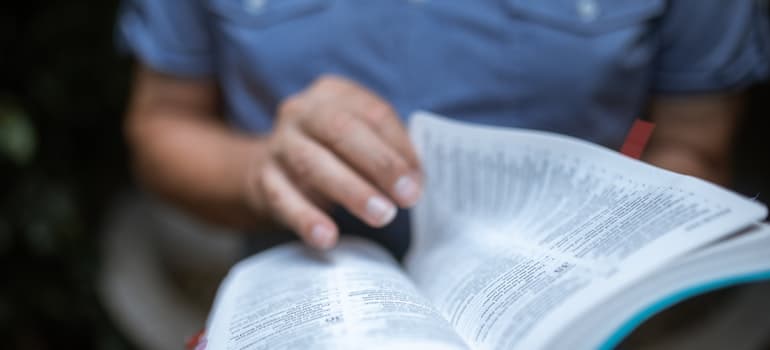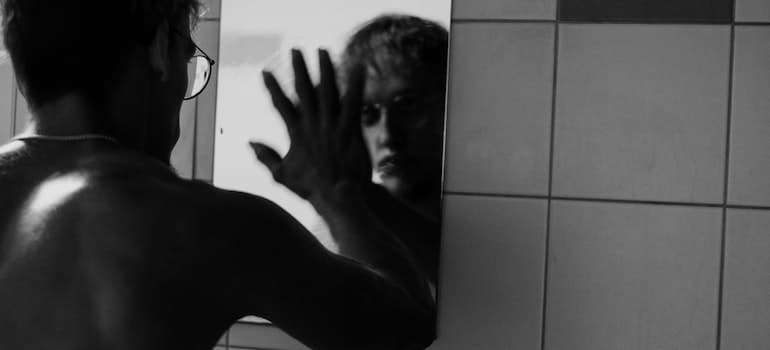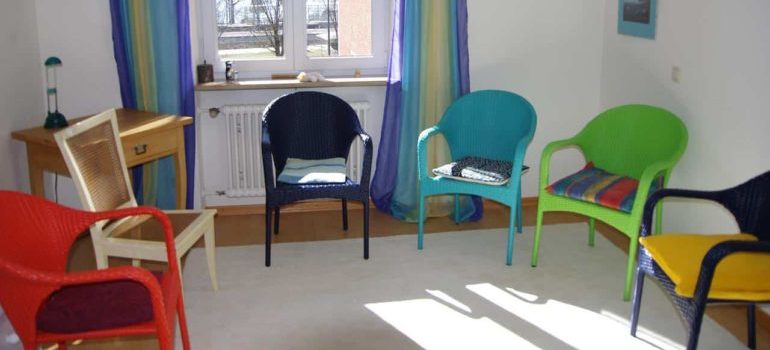While ultimately fruitful, rehabilitation can be a very challenging process. It isn’t just demanding, physically and psychologically, but it hinges heavily on your ability to heal emotionally. This requires a process of self-forgiveness, which not everyone is equally prepared for or open to. Still, it is crucial to practice self-forgiveness during rehab and even after to ensure a thorough recovery and prevent relapse.
As one of the best rehab centers in West Virginia, we at Harmony Ridge Recovery have seen the hardships of this process manifold. For this reason, here we’d like to outline it step by step – and, hopefully, help make your recovery all the easier.
Why Is It Important To Practice Self-Forgiveness During Rehab?
Initially, we should note that self-forgiveness is not just a pursuit of happiness. Yes, forgiving yourself can certainly make you happier, but that’s both universal and self-evident. It’s beneficial in that way, but as regards rehab that’s not where the value of self-forgiveness ends. Rather, it’s where it begins.
To explain this, let us pinpoint the exact benefits of self-forgiveness in the context of rehab.
#1 Building Recovery Capital
First, your overall ability to recover and maintain your addiction-free state depends on your recovery capital. We’ve covered this term before, so we’ll keep this section brief.
Robert Granfield and William Cloud defined recovery capital as follows:
“[Recovery capital is] the volume of internal and external assets to initiate and sustain recovery from severe alcohol or other drug problems.”
This sum of resources, mental reserves, and support networks can be broken down into 4 types, as William White does:
- The personal; your own financial stability, self-esteem, mental reserves, and so on.
- The cultural; the broader cultural group to which you belong, be it a spiritual, religious, or other type of group.
- Familial and social; the personal connections and broader support networks that make up your immediate “external assets”.
- The communal; the broader community frameworks that can facilitate recovery and help you through and after rehab.
In this context, it is crucial to practice self-forgiveness during rehab. Why? Because recovery capital begins with the personal; how you can help yourself, before anything and anyone else. Refusing to forgive yourself won’t strengthen you in that crucial sense, but only hold you back.

#2 Improving Self-Esteem And Mental Health
For that matter, this point bears stressing all in itself. Self-forgiveness markedly improves self-esteem, and by extension works wonders for your mental and even physical health. Especially in cases of dual diagnosis, or even just in general, better mental health helps bolster your personal recovery capital.
This isn’t just an assertion made from experience either. The American Psychological Association (APA) documents a wealth of studies that demonstrate this, including findings like:
- People who “scored high on measures of forgiveness” had the link between “high lifetime stress” and “poor mental health” removed ( Journal of Health Psychology , 2016)
- Forgiveness therapy models “alleviated depression, anxiety and PTSD in women who have experienced spousal emotional abuse” ( Journal of Consulting and Clinical Psychology , 2006)
- The same forgiveness therapy models “helped people forgive and also improved their mental health” (Journal of Consulting and Clinical Psychology , 2014)
As you can see, these benefits are too substantive to ignore. Embracing past wrongs and moving beyond them is absolutely crucial to better mental health – and understandably so.
#3 Forgiving Yourself To Forgive Others
A third crucial reason to practice self-forgiveness during rehab is that it allows you to forgive others – and vice versa.
As we’ll cover next, your family, partners, friends, and others in your life may have contributed to your addiction. This is a key challenge of family therapy, in fact – and in much the same way as they’ll have to forgive you, you will also have to forgive them. This is the best way to build familial and social recovery capital and build support networks that prevent relapse.

Self-forgiveness begins with guilt, and in this regard PubMed research is clear:
“Guilt-proneness positively predicts other-orientated empathy and conciliatory behavior […], while shame-proneness positively predicts personal distress empathy[.] Both guilt-proneness and shame-proneness also predicted acceptance. […] The discomfort of guilt-proneness may lead to more empathy for others, motivate a person to engage in reparative actions (e.g. apologise) and promote acceptance of themselves.”
Of course, forgiveness is not easy. It might be easier to forgive others than yourself, or vice versa. But working through your guilt toward a healthier state of mind can only benefit both you and your loved ones.
Ways to Practice Self-Forgiveness During Rehab
Now that you know why self-forgiveness is so crucial, let’s explore just how to practice it.
It is not an easy process, of course, and there is no single way to approach it that works for everyone. Still, we’ve found the following steps very effective throughout the years. In order, consider how this process might suit you.
#1 Remember Addiction Isn’t Entirely Your Fault
Self-forgiveness does start with guilt, but it’s just as crucial to remember not all guilt should fall on your shoulders. Yes, you will need to embrace your wrongs to forgive yourself. However, it’s equally important to not solely blame yourself for your addiction.
To do so, remember that many addiction drivers were not up to you. NIDA finds that genetics and epigenetics affect addiction tendencies, and so do one’s immediate environment, peer pressure, and other factors. Put simply, it wasn’t just your judgment that fueled addiction, but also elements beyond your control.
This is not to absolve you of responsibility, by any means. It is not a way to find excuses and shift the blame entirely. But taking up too much guilt can make self-forgiveness impossible or needlessly hard. Put simply, you will first need to pinpoint how much of it is yours to bear – and how much isn’t.

#2 Recognize The Grip Of Addiction
Second, you will need to recognize the grip of addiction before you can practice self-forgiveness during rehab. This has two meanings; recognize just how powerful it is in general, and how it has gripped your life specifically.
Addiction Types
Starting with the former, remember just how many addiction types there are and just how prevalent they’ve become. As treatment providers, we at Harmony Ridge have faced virtually all of them, including:
- Cocaine; a powerful illicit drug, cocaine addiction rehab has to account for just how addictive it tends to be.
- Fentanyl; a potent painkiller that sees ample misuse, fentanyl detox treatment often has to combat multiple withdrawal symptoms.
- Heroin; another powerful illicit drug, heroin rehab centers have thankfully continued to evolve towards addressing.
- Ambien; typically used to treat insomnia under FDA approval, prolonged Ambien use does still fuel addiction which requires swift Ambien rehab.
- Barbiturates; depressants with similar uses in treating sleep disorders, barbiturates similarly fuel addiction requiring barbiturates rehab.
- Benzodiazepine; better known as benzo, this type of depressant is just as addictive – often requiring benzo rehab to stop dependency.
- Marijuana; with some medical and some illicit uses, breaking free from this substance too often requires the services of a marijuana rehab center.
- Stimulants; a drug category including such household names as Adderall, any stimulants addiction rehab center can attest to their high addiction rates.
- Opiates; another broader drug type, opiates play a substantial role in the ongoing opioid epidemic – and their high addiction rates very often require opiate rehab center services.
- Methamphetamine; better known as meth, this illicit drug comes with both high potential for misuse and high overdose rates – which we, as a premier meth rehab center West Virginia has to offer, have to note.
As you can see, addiction is neither rare nor exclusive to illicit drugs. This too doesn’t excuse addiction, but to practice self-forgiveness during rehab it’s crucial to grasp this picture in full.
The Grip Of Addiction On You
Second, addiction types aside, you will have to deeply understand the grip of addiction on your life specifically. This doesn’t just align with 12-step based principles, as we’ll cover next, but is also fundamental to continuing to progress toward self-forgiveness.

To balance between healthy guilt and positive change, you may structure this in productive ways. Start with such questions as who you were or could be, continue with what addiction took away from you, and conclude with why you deserve to move on. You may wish to attach duty to it, as this works for many; regret what your loved ones suffered, and persevere to uphold your duty toward them.
This will largely depend on your recovery capital, yes, but there can be no recovery without forgiveness. And there can’t be forgiveness without awareness of your wrongs and the will to make them right.
#3 Face Your Wrongs
Once you’re past these initial contemplations, you can earnestly face your wrongs. This phase may be the hardest for many, but it is imperative. To truly be able to forgive yourself, you must first become able to accept your faults.
To do so and begin to practice self-forgiveness during rehab, you may:
- Confide in your therapist during individual therapy, where you have the comfort of privacy
- Engage in introspection when you’re alone, or during such activities as art therapy
- Begin to vocalize your guilt during motivational interviewing, where you’re the one guiding the process
How exactly you do so is a very personal process, so here we can only offer basic guidance. To get started, you may first think about who you harmed. Think about your relationships with those your addiction affected, and let your empathy guide your grasp of it. Try to see your wrongs from their perspective, and validate their feelings towards you.
Again, this is not to overwhelm you with guilt. Remember to give yourself enough leeway to grow past your wrongs; you’re only human, and your loved ones understand this. You yourself must understand this, but this must start with acceptance of guilt.

#4 Vocalize Your Struggles
Once you move past the stage of acceptance, you may begin to seek support outside of yourself. You may not be ready to forgive yourself just yet, but your peers can offer tremendous assistance on this quest.
Dual diagnosis often finds there are co-occurring mental health disorders alongside addiction, which can include:
- Anxiety
- Bipolar disorder
- Depression
- Eating disorders
- Personality disorders and borderline personality disorders
- Schizophrenia
- Trauma
- Autism
- OCD
- ADHD
- PTSD
Managing to practice self-forgiveness during rehab will help deal with such challenges, whether you’re facing them or fear you might. And whether you are or not, vocalizing your struggles in group therapy will strengthen your recovery capital to facilitate self-forgiveness.
Remember, later rehab stages offer group dynamics to help you heal. In this context, group therapy is an excellent opportunity to hear from your peers and share your struggles. You’re all in similar positions, so you won’t be judged; if anything, you’ll be understood deeply and honestly. Letting your peers empathize with you in this profound way may be just what you need to truly forgive yourself.

#5 Make Amends
Soon, often as early as just after inpatient programs, you will have opportunities to reconnect with your loved ones. It might be in family therapy or an outing, or perhaps a simple visit once you’re again staying at home. Depending on your progress and reserves, this phase is an excellent opportunity to begin to make amends.
It’s this exact phase where you can put your preparations thus far to action. You have left yourself to only feel as much guilt as should be yours; you’ve understood how addiction gripped your life and faced your wrongs; you’ve began externalizing your struggles and perhaps found some acceptance. But you may not fully practice self-forgiveness during rehab just yet, if you haven’t been forgiven by those you’ve wronged.
To address this, simply begin to make amends. Reach out to those you’ve grown apart from – perhaps those you’ve pushed away. Thank those who have stuck by you and supported you, and offer to repay their kindness. Apologize and mend old wounds where possible, and once you’ve been forgiven you may truly forgive yourself.
#6 Accept Forgiveness
After making amends with others and yourself, a final blocker may still lie within yourself. That’s guilt, plain and simple. Your guilt may still overshadow your efforts’ substance, making you unable to accept forgiveness.
This is perfectly normal, and everyone accepts forgiveness and moves on at their own pace. Not everyone will be able to forgive you at first, for that matter, and that’s only human too. However, you must consciously strive to lift this barrier, as much as you’re able. Once you’ve confronted your guilt, admitted your faults, and made amends, you will deserve forgiveness from those who can afford it. Most importantly, you will deserve self-forgiveness; you’ve faced your addiction’s grip and conquered it.

#7 Nurture Others
Finally, even if you do practice self-forgiveness during rehab, guilt may still loom in the back of your mind for a while past recovery. At this stage, aftercare programs offer a remarkably effective way to address this; by nurturing others after initial rehab.
To maintain your newfound sobriety, you may still attend 12-step based meetings. You may opt to even become someone’s sponsor. In all such cases, you will have the opportunity to nurture others and guide them through the same process you went through yourself. This won’t just cement your own recovery, but it will also help alleviate your final doubts. Once you assist others faced with what you went through, you’ll convince yourself of your capacity for good. And in many cases, that’s exactly what people need to fully forgive themselves.
The 12-step Based Process of Forgiveness Across Rehab
Finally, having noted aftercare, here we should reassure you this won’t be a strenuous journey. Rehab is structured in such a way that self-forgiveness is an ever-present pursuit, and you’ll always have opportunities and guidance.

To demonstrate this, simply consider the 12 Steps of Alcoholics Anonymous, the principles of which are used in all 12-step based programs. Once you do, examine how you can practice self-forgiveness during rehab as they apply to each step of the process:
- Inpatient Programs. Initial hospitalization already assumes some understanding of addiction’s impact. If you seek inpatient drug rehab in WV you will receive continuous guidance toward accepting hope for recovery, alongside forgiveness for your wrongs through counseling.
- Outpatient and Intensive Outpatient Programs. In turn, any intensive outpatient program West Virginia offers will present opportunities to seek forgiveness outside of yourself. It is here where you can truly begin to make amends and grow past your faults.
As you can see, the pursuit of self-forgiveness is not an additional struggle. It’s an integral, built-in component of the journey to recovery, which the structure of rehab itself will help you achieve.
Practice Self-Forgiveness During Rehab And Rise Above
In summary, forgiveness is a fundamental aspect of rehab and one that can have a tremendous impact on recovery. It hinges on understanding addiction, filtering your guilt, accepting your wrongs, and making amends before ultimately forgiving yourself. Thankfully this process follows the 12 steps and the rehab structure itself, allowing you to practice self-forgiveness during rehab and even past it to strengthen your resolve.
If you’d like to know more about this subject or our services, please don’t hesitate to contact us. From our state-of-the-art facilities to our experienced staff, we at Harmony Ridge Recovery are fully prepared to help guide you or your loved ones through the journey to recovery, catering to your unique needs at every step of the way.



